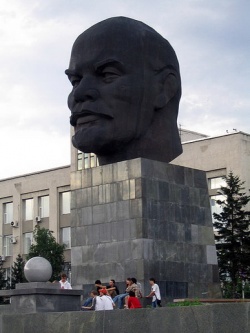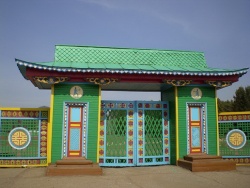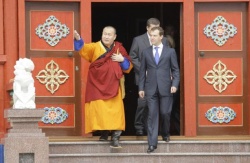Ulan-Ude
Ulan-Ude (Russian: Улан-Удэ; IPA: [ʊˈlan ʊˈdɛ]; Buryat: Улаан Үдэ, Ulaan Üde) is the capital city of the Republic of Buryatia, Russia, located about 100 kilometers (62 mi) southeast of Lake Baikal on the Uda River at its confluence with the Selenga. According to the 2010 Census, 404,426 people lived in Ulan-Ude; up from 359,391 recorded in the 2002 Census, making the city the third largest in eastern Siberia by population.
Ulan-Ude was first called Udinskoye (У́динское) for its location on the Uda River. From around 1735, the settlement was called Udinsk (У́динск) and was granted town status under that name in 1775.
The name was changed to Verkhneudinsk, literally "Upper Udinsk" (Верхнеу́динск), in 1783 to differentiate it from Nizhneudinsk ("Lower Udinsk") lying on a different Uda River near Irkutsk which was granted town status that year. The "upper" and "lower" refer to positions of the two cities relative to each other, not the location of the cities on their respective Uda rivers. Verkhneudinsk lies at the mouth of its Uda, i.e. the lower end, while Nizhneudinsk is along the middle stretch of its Uda.
The current name was given to the city in 1934 and means "red Uda" in Buryat, reflecting the Soviet Union's Communist ideology.
Geography
Ulan-Ude lies 5,640 kilometers (3,500 mi) east of Moscow and 100 kilometers (62 mi) southeast of Lake Baikal. It is located 600 meters (2,000 ft) above sea level at the foot of the Khamar-Daban and Khrebet Ulan-Burgasy mountain ranges, next to the confluence of the Selenga River and its tributary, the Uda which divides the city into two parts.
ULAN-UDE — The first secret that an Ulan-Ude resident whispered in my ear was something like: "Don't you feel the peace and the freedom of this place? The farther you are away from Moscow, the freer you are."
Standing on the main square, Ploshchad Sovietov, facing a huge Lenin monument and feeling the burning Asian summer sun on my neck, I had to confess that he was right.
Surrounded by two mountain ranges, Khamar-Daban and Ulan-Burgasy, Ulan-Ude is a place where a traveler traversing Siberia for the first time realizes that he is in Asia, far away from the Russian capital.
Arriving in Ulan-Ude represents a leap into a different Russian-Asian world. But the 5,640 kilometers to Moscow is not the only reason for the surprising feeling of freedom that sweeps over visitors. To a greater degree, the soothing influence of the local Buddhist culture gives newcomers the impression of a release from whatever may have them stressed— a tiring journey, a heavy workload, or just the general weariness of life.
Until the mid-17th century, the region around Ulan-Ude was home to the Buryats, a Buddhist nomadic subgroup of the Mongols.
Then Russian Cossacks built a fortress near where Ulan-Ude is now, realizing that the spot was along a perfect trading route between Russia and China.
Today, many buildings are reminiscent of Ulan-Ude's rich pre-Soviet trading traditions. In the city center and along the bank of the Uda River stand old merchant mansions, richly decorated with wood and stone carvings.
In sharp contrast to these exceptional examples of Russian classicism is Ivolginsky Datsan, a Buddhist spiritual center 23 kilometers from Ulan-Ude. The spiritual activities of Ivolginsky Datsan, which opened in 1945, are manifested in temples rites, medical practices and the Buddhist educational system.
Ulan-Ude is a city where these kinds of extremes seem to live harmoniously together: merchants next to Buryat Buddhists, European Russian culture beside Asian Mongolian culture. Since its founding, the city has served as a hub between Russia and the East, and nowadays the government in Moscow seems to have rediscovered the strategic importance of Ulan-Ude as a port to Asia, not least of all because in September 2012 the city will host an international economic forum called "New Economy — New Approaches"


